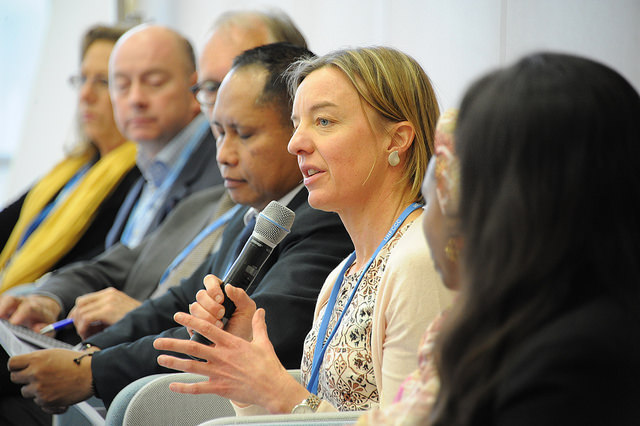Since the establishment of the Paris Committee on Capacity Building by the Paris Agreement in 2015, the Foundation has been working with Parties to address human rights, gender equality and indigenous peoples’ knowledge as cross cutting issues in the context of capacity building for climate action.
The 7th Durban Forum on Capacity-building took place in Bonn during SB 48 in May 2018, co-facilitated by Mr Russell Miles, Australia and Ms Rita Mishann, Guatemala. The Forum’s focus was on the capacity building for NDC implementation in developing countries and there were a number of sub-themes including enhancing capacities for the integration of gender responsiveness and human rights into climate action. The Foundation participated in the Forum, using the opportunity to demonstrate the progress made to date on gender responsive capacity building, including the forthcoming work under Gender Action Plan, as well the capacity gap that exists in relation to human rights.
Speaking on the panel, Dr Tara Shine, Special Adviser to the Foundation stated that ‘There is no Action Plan or even agenda item on human rights to guide Parties and so it is critical that the PCCB develop further work to address this capacity gap’. Dr Shine proposed a series of actions to be taken up by the PCCB to fill this gap and these actions were captured in the Co-Facilitators report to the PCCB:
- The PCCB should formally recognize human rights, gender responsiveness and indigenous peoples’ knowledge as capacity gaps
- Co-produced tools and trainings on human rights and climate could help meet the demands posed in the pre-amble of the Paris Agreement
- The production of guidelines on human rights and climate should be given priority;
- Co-organizing a workshop with the office of the High-Commissioner for human rights to better understand capacity gaps and to identify actions to fill those gaps could be considered by the PCCB
- The UNFCCC should establish focal points on human rights and indigenous peoples (a gender focal point already exists)
- The PCCB should consider adding a specific page on the Capacity Building Portal to capture experiences and good practices related to the integration of human rights, gender equality and indigenous peoples’ rights in climate change plans (including NAPs, NAMAs, NDCs) and actions.
The proposal for a human rights focal point in the UNFCCC to build capacity on rights based approaches in the Secretariat and amongst Parties was supported by Costa Rica and all the participants in the breakout group on the cross cutting issues.
As a result of the inputs from the Co-Facilitators of the Durban Forum the PCCB decided, in relation to work on its theme for 2018 to:
- recognize and continue to address capacity-building gaps related to cross-cutting issues, such as human rights, just transition, gender responsiveness and indigenous people’s knowledge, in the context of NDC implementation;
- pursue the organization of activities (e.g. a side event at COP 24 or a workshop) on the issue of human rights and climate change, in order to better understand capacity gaps and to identify actions to fill those gaps.
The PCCB Working Group II on the cross cutting issues will roll out these activities as part of its Work Plan in the coming months, under the leadership of Ms Jeniffer Hanna of the Dominican Republic.


